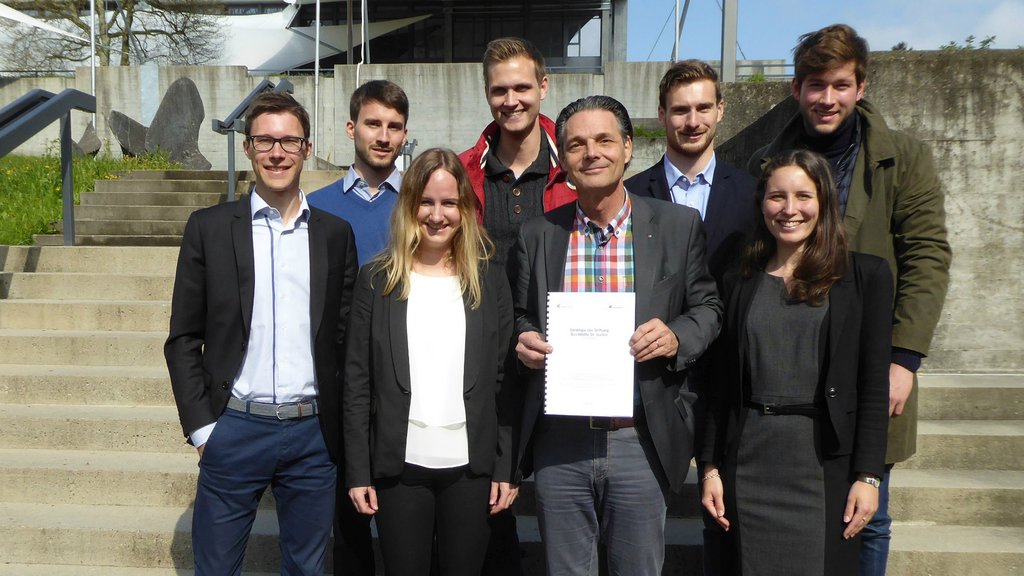Campus - 16.06.2016 - 00:00
HSG students advise the St.Gallen Addiction Support Foundation
At first sight, they are two unlikely partners. When they looked more closely, HSG students and the Addiction Support Foundation realised that a joint project could be valuable for both and bring them closer together. A contribution by HSG student Thomas Tarantini.
Source: HSG Newsroom

17 June 2016. The objective of the St.Gallen Addiction Support Foundation is to help people with addiction problems at a physical, psychological and social level. Since 1990, the organisation has been actively involved in the treatment of and fight against various dependencies with a constantly growing range of services. In its work, the Foundation pursues a strategy, just like any other enterprise. This strategy must be reviewed on a regular basis. It was with this task that the Foundation’s CEO, Jürg Niggli, approached the University of St.Gallen last year.
Work on this task was conducted in the framework of a practical project in the Master’s programme in Business Management (MUG), in which groups of students directly cooperate with an enterprise for the course of one year. Consequently a team made up of six MUG students and their supervisor Joachim Stonig, a doctoral student at the Institute of Management, dealt with the task set by Jürg Niggli.
New ideas and respect for whatever is in place
“It was a challenge to find the right balance between the familiar business-administrative perspective and the Foundation’s social mission, whose supreme objective is neither efficiency nor money,” says Joachim Stonig. The team always made an effort to find an appropriate mixture of their own ideas and respect for whatever was already in place. The students were impressed that the knowledge they had acquired could also be applied to an enterprise in the realm of social work. The course of action recommended in the context of the strategy review was accepted by the Foundation; some recommendations have already been implemented, which validates students’ newly acquired knowledge.
Their recommendations for action can be itemised as follows: focusing more strongly on clients, providing the network with a structure, and encouraging the addicts’ integration with an extension of options in the field of work and leisure projects. A stronger client focus means here that people with addiction problems and their relatives must be appealed to more directly, particularly through the Foundation’s website. Thus such persons’ specific problems should be addressed instead of highlighting the services provided by the organisation. The network structure is explained by Joachim Stonig as follows: “Only through cooperation with other private and public institutions is addiction support able to provide clients with comprehensive care and to improve general conditions. For such cooperation to work in the long term rather than being scuppered by personnel fluctuations, it must be accompanied by certain formalities and processes.” This is a particular challenge in the strongly person-related and trust-based sphere of social work.
Similar projects are possible
In May 2016, a presentation of the results brought the project to its conclusion. The outcome is consistently positive. Both supervisor Stonig and the St.Gallen Addiction Support Foundation were extremely pleased with the students’ work. The students, on their part, are pleased that they were also able to contribute something to the field of social work in the region while being engaged in their regular studies. On the strength of these impressions, Joachim Stonig can imagine further similar projects, both with teams of Master’s students and of undergraduates. A continuation of cooperation with the St.Gallen Addiction Support Foundation was also possible and would certainly create added value for all those involved.
Thomas Tarantini is studying Business Administration in the fourth semester and is also enrolled in Book and Publishing Studies.
Photo: Jürg Niggli presents the strategy paper with students Julia Henle, Julia Hirsch, Ralf Cuonz, Robin Dreyer, Jonas Grefe, David Nussbaum and the project supervisor Joachim Stonig (from the left).